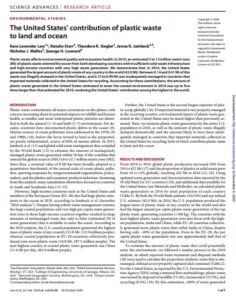A study published in the journal Science Advances has revealed that the US ranks as high as third among countries contributing to coastal plastic pollution.
The new research challenges the once-held assumption that the US is adequately “managing” its plastic waste. A previous study using 2010 data that did not account for plastic scrap exports had ranked the US 20th, globally, in its contribution to ocean plastic pollution from mismanaged waste.
Using plastic waste generation data from 2016 scientists from Sea Education Association, DSM Environmental Services, University of Georgia, and Ocean Conservancy calculated that more than half of all plastics collected for recycling (1.99 million metric tons of 3.91 million metric tons collected) in the United States were shipped abroad.
Of this, 88% of exports went to countries struggling to effectively manage, recycle, or dispose of plastics; and between 15-25% was low-value or contaminated, meaning it was effectively unrecyclable. Taking these factors into account, the researchers estimated that up to 1 million metric tons of U.S.-generated plastic waste ended up polluting the environment beyond its own borders.
For years, so much of the plastic we have put into the blue bin has been exported for recycling to countries that struggle to manage their own waste, let alone the vast amounts delivered from the United States
said lead author Dr. Kara Lavender Law, research professor of oceanography at Sea Education Association.
Using 2016 data, the paper also estimated that 2-3% of all plastic waste generated in the U.S. – between 0.91 and 1.25 million metric tons – was either littered or illegally dumped into the environment domestically. In combination with waste exports, this means the United States contributed up to 2.25 million metric tons of plastics into the environment. Of this, up to 1.5 million metric tons of plastics ended up in coastal environments. This ranks the United States as high as third globally in contributing to coastal plastic pollution.
The United States generates the most plastic waste of any other country in the world, but rather than looking the problem in the eye, we have outsourced it to developing countries and become a top contributor to the ocean plastics crisis
added Nick Mallos, senior director of Ocean Conservancy’s Trash Free Seas® program and a co-author of the study.
The study noted that although the United States accounted for just 4% of the global population in 2016, it generated 17% of all plastic waste. On average, Americans generated nearly twice as much plastic waste per capita as residents of the EU.
Natalie Starr, principal at DSM Environmental Services and a co-author of the study, highlighted the need to change the math by investing in recycling technologies and collection programs, as well as accelerating research and development to improve the performance and drive down the costs of more sustainable plastics and packaging alternatives to address the current challenge.


































































